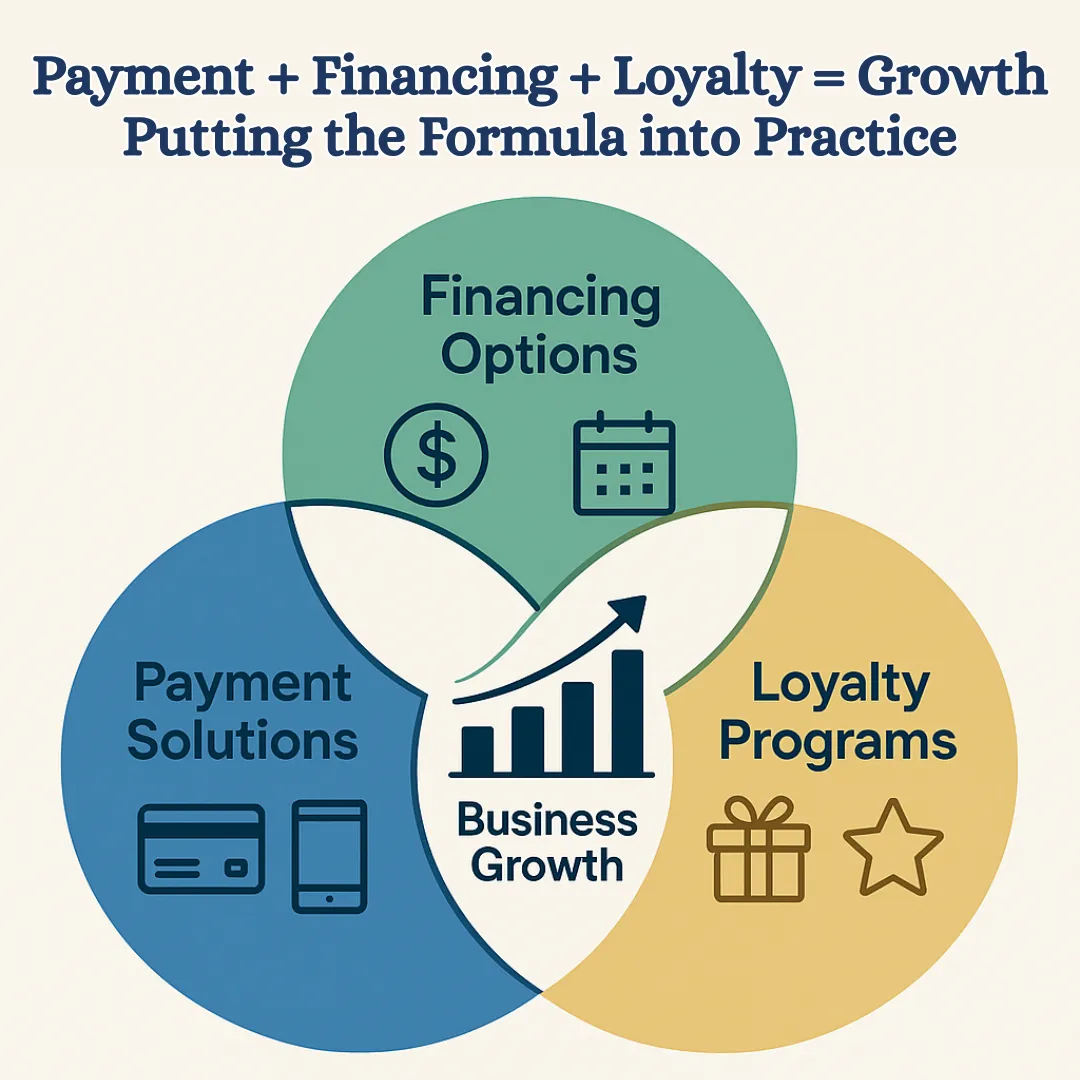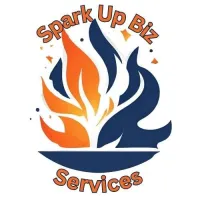Our Latest Articles

Payment + Financing + Loyalty = Growth: Putting the Formula into Practice
Payment + Financing + Loyalty = Growth: Putting the Formula into Practice
In today’s competitive business environment, small and medium-sized businesses (SMBs) must do more than just offer great products or services—they must create a seamless, value-driven customer experience. One of the most effective ways to achieve this is by integrating three powerful components:
Payment + Financing + Loyalty = Growth
This formula isn’t just a catchy phrase—it’s a strategic framework that aligns customer convenience with business profitability. When implemented correctly, it can lead to increased conversion rates, higher customer lifetime value, and long-term brand loyalty.
In this article, we’ll explore each component in depth, provide actionable strategies, and show how integrating them can create a scalable growth engine for your business.
1. Introduction: Why This Formula Works
The modern consumer expects convenience, flexibility, and personalization. Businesses that meet these expectations are rewarded with loyalty, referrals, and increased revenue. The formula Payment + Financing + Loyalty = Growth works because it addresses three critical stages of the customer journey:
Payment: The final step in the buying process—must be fast, secure, and frictionless.
Financing: Reduces financial barriers, increases average order value, and encourages upselling.
Loyalty: Builds long-term relationships and incentivizes repeat business.
Together, these elements create a holistic experience that drives sustainable growth.
2. Payment Solutions: Building Trust and Reducing Friction
Why Payment Matters
The payment process is often the last touchpoint before a sale is completed. A poor experience here can result in cart abandonment, lost revenue, and diminished trust.
According to Baymard Institute, the average cart abandonment rate is 69.57%, with poor checkout experiences being a major contributor.
Key Payment Features to Implement
Multiple Payment Methods: Credit/debit cards, mobile wallets (Apple Pay, Google Pay), ACH transfers, and even cryptocurrency.
One-Click Checkout: Reduces friction for returning customers.
Secure Gateways: PCI-compliant platforms Eprocessing Network, PayAnywhere, and Authorize.net.
Recurring Billing: Ideal for subscription-based services or memberships.
Mobile Optimization: Ensure the checkout process is responsive and fast on smartphones.
Strategic Benefits
Higher Conversion Rates: Customers are more likely to complete purchases.
Improved Trust: Secure and familiar payment options build credibility.
Reduced Abandonment: Streamlined checkout processes lower drop-off rates.
Case Study
A local Broadalbin-based wellness studio integrated Apple Pay and Google Pay into their mobile booking app. Within three months, they saw a 22% increase in mobile bookings and a 15% reduction in checkout abandonment.
3. Financing Options: Empowering Customers to Spend More
Why Financing Drives Growth
Financing options make products and services more accessible, especially for higher-ticket items. They also encourage customers to spend more by reducing the psychological barrier of upfront costs.
An industry report found that businesses offering BNPL (Buy Now, Pay Later) options saw a 30–50% increase in average order value.
Financing Models for SMBs
Installment Plans: Break down payments into manageable monthly amounts.
BNPL Services: Multiple partners are available (book a time with us and we can help guide you!)
In-House Financing: Offer direct credit options with clear terms and low interest.
Subscription Billing: For service-based businesses, monthly or quarterly billing improves cash flow and retention.
Implementation Tips
Transparency: Clearly communicate terms, interest rates, and payment schedules.
Integration: Make financing options visible and easy to select during checkout.
Marketing: Promote affordability in your messaging (e.g., “Only $49/month!”).
Strategic Benefits
Increased Accessibility: Customers can afford more without financial strain.
Higher Average Order Value: Financing encourages upselling and bundling.
Improved Cash Flow: Predictable revenue from installment or subscription payments.
Case Study
An independent contractor offering home renovation services in upstate New York began offering 6-month financing through a third-party provider. The result? A 40% increase in project bookings and improved customer satisfaction.
4. Loyalty Programs: Turning Customers into Advocates
Why Loyalty Is Essential
Customer retention is more cost-effective than acquisition. Loyalty programs incentivize repeat purchases, increase customer lifetime value, and foster brand advocacy.
According to Harvard Business Review, increasing customer retention by just 5% can boost profits by 25% to 95%.
Types of Loyalty Programs
Points-Based Systems: Earn points for purchases, redeem for discounts or freebies.
Tiered Rewards: Encourage higher spending with escalating benefits.
Referral Bonuses: Reward customers for bringing in new business.
Exclusive Access: Early access to products, events, or VIP perks.
Best Practices
Personalization: Use purchase history to tailor rewards and offers.
Omnichannel Integration: Track loyalty across online and in-store purchases.
Gamification: Make earning rewards fun with challenges or milestones.
Strategic Benefits
Higher Retention Rates: Customers return for rewards.
Increased Engagement: Personalized offers drive interaction.
Brand Advocacy: Loyal customers become vocal promoters.
Case Study
A boutique in Broadalbin launched a tiered loyalty program offering free merchandise and exclusive discounts. Within six months, they saw a 60% increase in repeat purchases and a 35% boost in referral traffic.
5. Integration Strategy: Creating a Unified Customer Experience
Why Integration Matters
When payment, financing, and loyalty systems work together, they create a seamless customer journey that encourages spending, builds trust, and fosters long-term relationships.
How to Integrate
Link Loyalty with Financing: Offer bonus points for financed purchases or subscriptions.
Use Payment Data for Personalization: Analyze transaction history to tailor loyalty rewards and financing offers.
Automate with Technology: Use CRM and POS systems that sync payment, financing, and loyalty data.
Strategic Benefits
Higher Conversion Rates: Customers are more likely to complete purchases with flexible payment and financing options.
Increased Customer Lifetime Value: Loyalty programs keep customers coming back.
Improved Cash Flow: Financing and subscriptions provide predictable revenue streams.
6. Technology Stack: Tools to Support the Formula
Recommended Platforms
We could recommend quite a few. It's most important though...FOR WHAT YOUR NEEDS ARE. WE INVITE YOU TO SET A MEETING WITH US SO WE CAN FINDTHE BEST SOLUTIONS TO FIT YOUR NEEDS.
Integration Tips
Choose platforms with open APIs for easy integration and that connect to multiple gateways.
Ensure mobile compatibility across all systems.
Use analytics dashboards to track performance across all components.
7. Industry Applications: Real-World Use Cases
Retail
Challenge: High cart abandonment and low repeat purchases.
Solution: Implement BNPL, mobile payments, and a points-based loyalty program.
Result: 35% increase in conversion rates and 50% boost in customer retention.
Service-Based Businesses
Challenge: Irregular cash flow and low customer engagement.
Solution: Subscription billing, referral rewards, and CRM-based personalization.
Result: 40% increase in recurring revenue and 60% growth in referrals.
Local Contractors
Challenge: Price sensitivity and seasonal demand.
Solution: Offer financing for large projects and loyalty discounts for repeat clients.
Result: 30% increase in bookings and improved customer satisfaction.
8. Measuring Success: KPIs and Analytics
Key Performance Indicators
Conversion Rate: Track changes after implementing payment and financing options.
Average Order Value (AOV): Measure the impact of financing.
Customer Retention Rate: Evaluate loyalty program effectiveness.
Customer Lifetime Value (CLV): Combine all metrics to assess long-term growth.
Referral Rate: Monitor the success of loyalty-driven word-of-mouth.
Tools for Tracking
Google Analytics
CRM dashboards
POS reports
Loyalty program analytics
Financing provider insights
9. Common Pitfalls and How to Avoid Them
Pitfall 1: Overcomplicating the Checkout Process
Solution: Keep it simple. Use one-click checkout and minimize form fields.
Pitfall 2: Hidden Financing Terms
Solution: Be transparent. Clearly display interest rates and payment schedules.
Pitfall 3: Generic Loyalty Programs
Solution: Personalize rewards based on customer behavior and preferences.
Pitfall 4: Poor Integration
Solution: Choose platforms that integrate seamlessly and automate data syncing.
10. Final Thoughts: Growth That Lasts
For CEOs and business owners, growth isn’t just about scaling—it’s about building a resilient, customer-centric business. By aligning payment, financing, and loyalty strategies, you create a powerful ecosystem that drives revenue, enhances customer satisfaction, and sets the stage for long-term success.
Whether you're running a local service business or scaling a digital brand like SparkUpBiz, this formula can be tailored to your unique goals and customer base.
#SmallBusinessGrowth #CustomerLoyaltyStrategies #FinancingForSMBs #DigitalPayments #BusinessDevelopment
#CustomerExperience #RetailMarketing #SubscriptionBusiness #POSSystems #EntrepreneurTips


